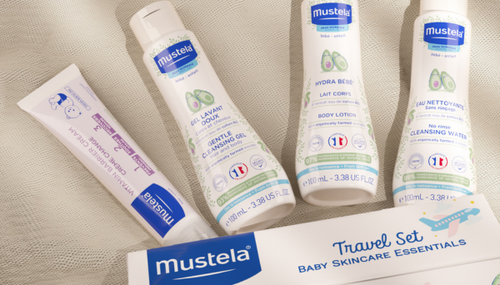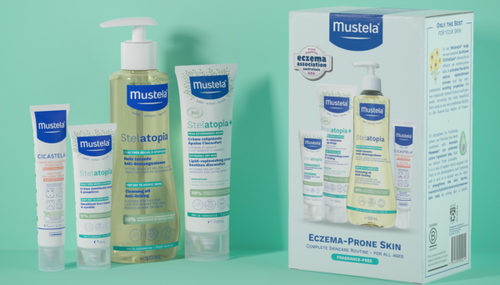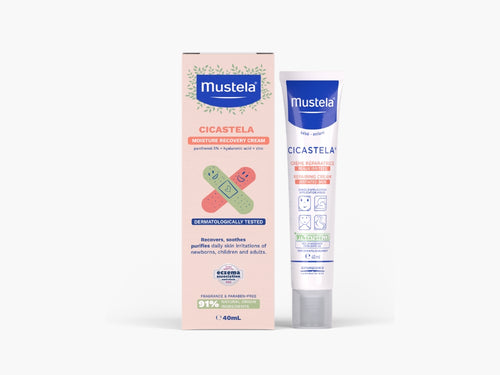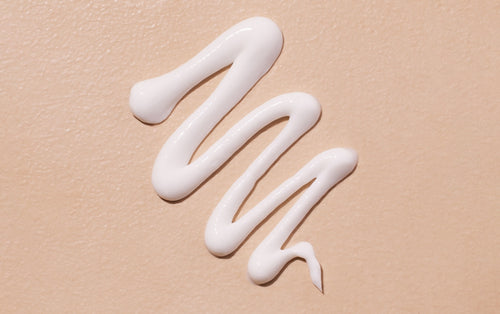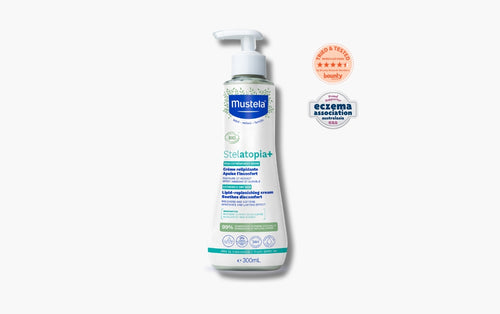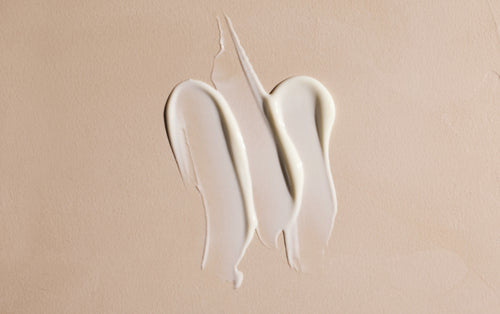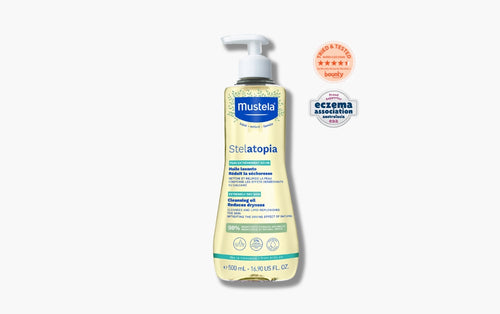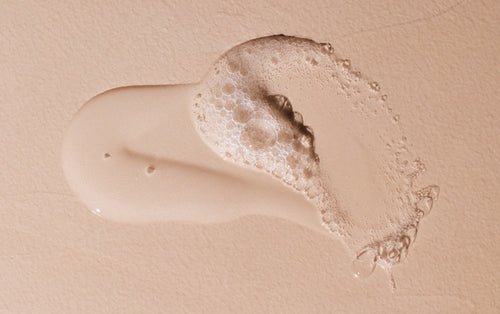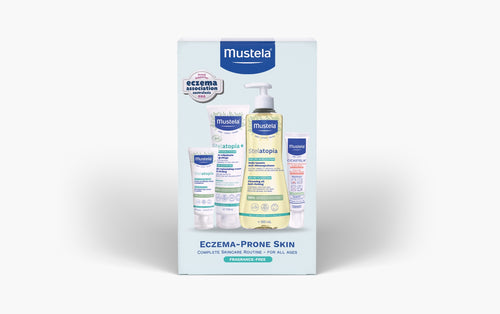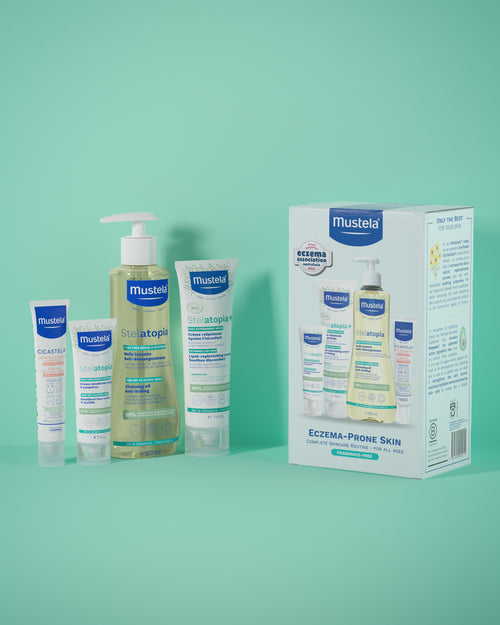Written in partnership with Dr. Clarence De BELILOVSKY, dermatologist; member of the Mustela experts circle
• Does breastfeeding has a positive or a negative role on eczema-prone skin?
It’s a question that can divide opinions. Some people think that it helps to protect your baby from many infections and allergies. That is true. Other people will say that if the child is already allergic, the mother should exclude some foods from her diet so as not to transmit allergens to her child. But there is no formal proof of this precaution. The best approach is to talk about it with your doctor. eczema-prone skin is rarely associated with a food allergy so there shouldn’t be any reason not to breastfeed your child if it is what you prefer. On the contrary!
• Which specific skincare products and treatments can I use on a day-to-day basis to cure my baby’s eczema-prone skin?
Use emollients products on a daily basis. The formulas enriched with baby/child specific skincare products help rebuild the oily layer of your baby’s skin and repair and protect its skin barrier. What is also extraordinary is that they can reduce the itching immediately by up to 95%! This is the case for Mustela products like the Stelatopia Emollient balm or Stelatopia Emollient Cream. You can apply them at least twice a day (see Application advice), after the shower for instance, and even during the bath. To summarize, they are the essential care in case of eczema-prone skin. There is just one precaution: in case of flare-ups, do not apply emollient products on oozing patches. In this case, your doctor will prescribe a treatment more adapted to the patches (see How to cure eczema-prone skin).
• Should I vaccinate my child if he has eczema-prone skin?
Absolutely. Not only do vaccines not aggravate eczema-prone skin but they protect your baby against many diseases such as diphtheria, tetanus or polio. Even if your child has little chance of having these infections, it is important to have a valid vaccination record. The only thing we can advise is to delay the vaccination date if a flare-up occurs and not upset your baby further.
• When is my child at risk of eczema flare-ups?
It is impossible to know exactly since it depends on your child’s atopic terrain and sensitivity. What we can say for sure is that eczema-prone skin alternates between flare-ups and periods of respite. These periods can be extended thanks to adapted skincare products like baby/child specific emollient skincare products and some daily precautions,like ventilating the home or avoiding activities that encourage sweat. Furthermore, we know that there is more chance of flare-ups occurring when your baby is teething or has the flu, that is to say in medical terms, a nasopharyngitis.
• If eczema-prone skin is hereditary, is the intensity of flare-ups also so?
Absolutely not. Don’t worry if you or your partner have had bouts of severe itching. Your child will have their own kind of eczema-prone skin that may be less affected despite the experiences you have had.
• Does eczema-prone skin leave marks on the baby’s skin?
Not at all. Even if rashes are severe and develop into oozing patches and then into a crust (see How to recognize an eczema-prone skin?). This is good news. Here are two more good pieces of news: eczema-prone skin is not contagious and tends to abate with age.
• Do you have to exclude certain foods to avoid eczema flare-ups?
Not necessarily. eczema-prone skin is rarely caused by a food allergy or intolerance. If you have any doubts, the best thing to do is to talk about it with your doctor. However, some foods can have an irritating contact with the skin. When swallowing it, the contact with the mouth and around the mouth could trigger the immune system and generate a flare-up. Again, don’t hesitate to consult a dermatologist or an allergist in case of doubt.
• My child has visible lymph nodes during flare-ups. Is this normal?
Yes, it can happen. During a flare-up, there is a skin inflammation (see eczema-prone skin). The body has to defend itself and this can be the simple reason for the appearance of lymph nodes. You think that the patches may be superinfected? Don’t worry, this is rare. The best way to be sure is to consult your doctor.
• What is the difference between eczema-prone skin and eczema due to contact (contact dermatitis) ?
They have just one thing in common: they are allergic reactions. On the one hand, eczema-prone skin is often hereditary. It can appear from the first months after your baby’s birth and, in most cases, tends to abate with age1. It alternates between periods of respite and flare-ups that sometimes cannot be explained. On the other hand, eczema due to contact can appear at any age, but more often during puberty or as an adult. Its appearance is easy to explain. It is a reaction of the skin when it is in contact with a specific product or a material: solvent, nickel, medicine, rubber and so on. As soon as it disappears, associated treatments can be stopped, unlike eczema-prone skin that will follow a certain evolution when a flare-up occurs.
• What can I do to prevent eczema flare-ups?
If we cannot entirely prevent eczema-prone-skin, some precautions can help you avoid flare-ups. First, you can rely on baby/child specific emollient skincare products which help rebuild the oily layer of your baby’s skin and repair and protect the skin barrier. They also immediately allow a 95% reduction reduce itching. You can also adopt a few daily steps to provide a suitable environment for your child: ventilate your home, and don’t forget to put the teddy bears in the washing machine from time to time!
